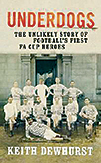 The unlikely story of football’s first FA Cup heroes
The unlikely story of football’s first FA Cup heroes
by Keith Dewhurst
Yellow Jersey Press, £16.99
Reviewed by Huw Richards
From WSC 306 August 2012
Keith Dewhurst has already quarried personal memories as a young journalist catapulted into the Manchester Evening News‘s United beat by the death of his predecessor at Munich to produce a memoir acclaimed in WSC 302 as “one of the best football books of its type ever written”.
Now he digs further, into family heritage in the Lancashire mill town of Darwen, to tell the story of the team that, in 1879, shook the still-nascent football world by twice holding the heavily favoured Old Etonians in an FA Cup quarter-final, before succumbing in the second replay.
All three games, thanks to FA rules and the refusal of the Etonians to either play extra-time or travel to Lancashire, were played at The Oval – then English sport’s national stadium – forcing Darwen into a succession of long, expensive and ultimately exhausting journeys.
A different outcome might have changed the title. Darwen, mostly millhands, gave away inches and stones per man to better-fed opponents. “Giantkiller” would have had a literal element.
The story, often bracketed with nearby Blackburn Olympic’s defeat of the Old Etonians in the 1883 final as a key marker in the game’s democratisation, is well known. Dewhurst, though, aims to put flesh on bare bones, to give life to the silent figures in team photographs and explain why this corner of Lancashire adopted football so passionately.
He puts both teams – he also looks closely at the Etonians – into the context of the early development of football and of wider social currents. This is a multifaceted story with regional and tactical dimensions – the Etonians played a very different game to the fluid, Scottish-inflected style of Darwen – as well as the obvious class aspects.
Dewhurst has dug widely and clearly enjoyed the archives. The outcome has a certain picaresque charm. A large cast of characters includes William Gladstone, an escaped gorilla and mad mill magnates. How can you not love a book that contrives to use “Antidisestablishmentarianism” as a chapter title?
As befits a well-established playwright, Dewhurst handles his large cast with skill. Individuals such as team captain James Knowles, who emigrated to the US before the end of the season, and the remarkable Dr James Gledhill, a tantalising link to the great Preston team of a decade later, emerge from the fog of history.
Along with this are subtle, thoughtful examinations of issues such as why Darwen went to such lengths to deny that their Scottish imports, Fergus Suter and Jimmy Love, were professionals – they almost certainly were – even though payments were not illegal until 1882.
It is, Dewhurst points out, part of the arbitrariness of history that Suter is memorialised in the Dictionary of National Biography as the first professional while Love disappeared so completely that nobody is sure even when he died. Dewhurst, typically, has found a credible answer. Now, though, this entire team has the memorial that it richly deserves.